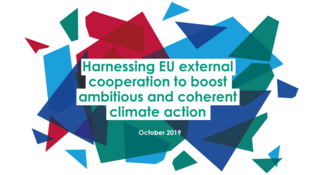
Harnessing EU external cooperation to boost ambitious and coherent climate action
Iacobuta, Gabriela / Mariella Di Ciommo / Niels Keijzer / Hanne Knaepen / Lola Valllejo / Steffen BauerExternal Publications (2019)
Brussels: European Think Tanks Group
The EU has always considered itself a leader in global climate governance, although its influence in climate diplomacy has varied over time. How the EU approaches climate change in its development cooperation and how well it manages to align practices with principles bear the potential to either improve the EU’s image as a climate leader or to make its credibility wither further.
Given the strong interlinkages between climate and sustainable development, we argue that climate action should be at the core of the incoming Commission’s agenda for development cooperation. In this policy brief, we present our case for the imperative of 1.5°C-compatibility in all EU measures, the need for clear guidelines and financial resources to support this, and for a generally strengthened EU climate diplomacy.
KEY MESSAGES
● In view of expected climate-change impacts, the EU should aim for 1.5°C-compatibility throughout its domestic and external action. This requires the EU to define clear guidelines for 1.5°C-compatible action in each country context, together with country partners, and to develop a list of development-cooperation activities that would need to stop altogether.
● The EU will need to allocate adequate financing for climate action, well above the currently proposed 25% share of expenditure in the upcoming Multiannual Financial Framework (MFF), and to ensure 1.5°C-compatibility of all financing. Financial support should consider countries’ development priorities, needs and resources and boost their confidence for higher climate ambition. Private sector contributions could be further stimulated through existing and new programmes.
● So far, climate financing from the EU and elsewhere has been disproportionately channelled towards middle-income countries and mitigation. While middle-income countries offer higher potential for emissions reductions, more direct support should be geared towards adaptation and resilience in highly vulnerable least-developed and lower-middle-income countries.
● The EU should strengthen its climate diplomacy through new and improved bilateral, triangular and multilateral partnerships for development cooperation. These should foster knowledge exchange and dialogue to advance policy coherence and innovation.
● Policy coherence should be improved internally, through better coordination between the EU and EU-member states (vertically), EU-level institutions (horizontally, different areas of action), and within specific areas of EU external action (sectorally).
● EU climate commitments need to be underpinned by commensurate domestic policies and adequately ambitious submissions of targets and long-term strategies to the UNFCCC, in line with carbon-neutrality by 2050 and sending clear signals for international climate finance and support.



